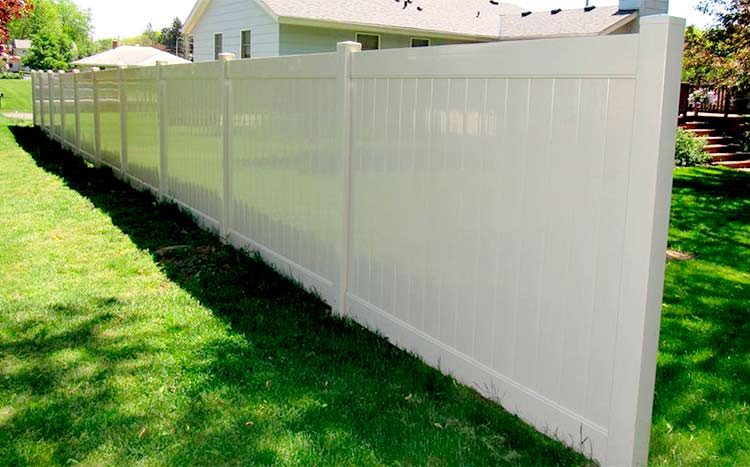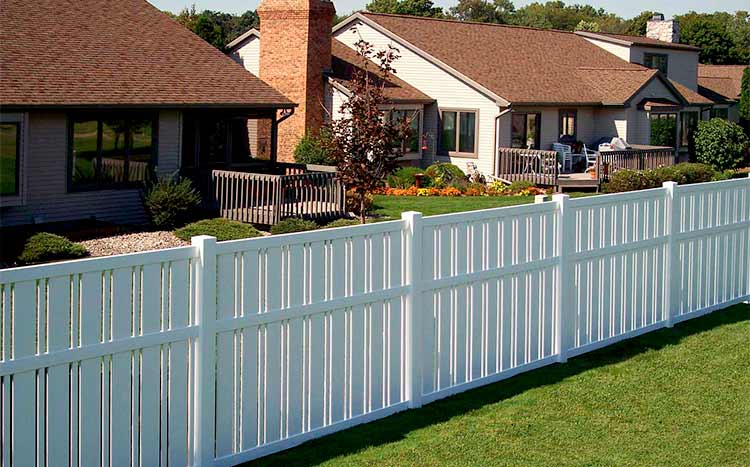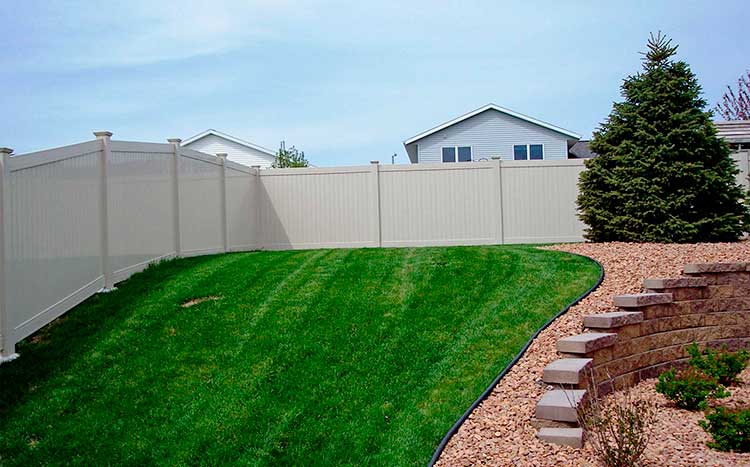Vinyl fencing has gained popularity among homeowners thanks to its widespread allure. The key reasons for its favoritism are its outstanding longevity, low upkeep needs, and a vast array of stylish options that seamlessly enhance a home’s visual charm.
A vinyl fence typically lasts between 20-30 years, and this is without having to spend a lot of money and effort towards maintaining it. When compared to the 14-15 years that a high-quality wooden fence typically lasts, it is easy to see why most homeowners love these types of fences in spite of the size of the initial investment that they usually require.
However, longevity is not all that vinyl offers. Here is what you should know about vinyl fences and why you should consider them as a fencing option the next time you go shopping for a new fence.

Do vinyl fences break easily?
No, vinyl fences do not break easily. They are incredibly durable and are resistant to most weather elements.
Initially, when vinyl fences burst onto the scene, they had a reputation for turning brittle when exposed for prolonged periods to the sun. However, this is a problem that has long been fixed once the utility of aluminum oxide was realized. Mixing vinyl with this compound makes it less susceptible to the harmful effects of prolonged sun exposure. As a result, modern vinyl fences tend to display remarkable toughness and durability even after years of sun exposure.
Are vinyl fences good in the wind?
Yes, vinyl fences are good in the wind and when properly installed, they can withstand extremely strong winds. However, it is important to note that the average vinyl fence is usually designed and installed to withstand normal winds. This means that if you live in an area that experiences strong gusts of wind, you will have to make a few adjustments in the way you install the fence, and the type of materials that you use.
For starters, you will have to choose sturdier and thicker posts that are strong enough to not only withstand the wind, but also carry the weight of the fence. Going for posts that are about 5 inches square is advisable. These posts also need to have a wall thickness that corresponds to the strength of the wind that it will be exposed to.
In addition to using strong posts, you will also have to take extra steps to ensure that these posts are properly secured to the ground. Embedding it in concrete that is up to 24 inches into the ground is usually good enough to secure fences in high-wind areas. Giving it support with aluminum rails, specialized fasteners, extra-strong hinges, and post caps that are designed to help boost its strength, is also advisable.
Reinforcing the fence with both concrete and aluminum to create a more stable base, is also something that usually helps.
The durability of Vinyl and PVC fences
Vinyl and PVC fences are incredibly durable. These fences are typically resistant to sunlight, do not suffer the risks of rotting and other biological processes, and are resistant to being corroded by strong chemicals.
What makes it even better is the fact that these fences are durable without needing any kind of specialized treatment. Unlike wood fences, they don’t require to be coated in order to last longer. They also don’t need to be protected against termites and other pests.
The durability of vinyl and PVC fences usually allows them to last for decades without needing to be replaced. In fact, it is the reason why some manufacturers are usually confident enough in their products to the extent that they offer warranties that are as long as 30 years. And it is also the reason why even though vinyl and PVC fences tend to call for significant investments, most homeowners consider them a worthwhile expense especially when their purchase price is spread over their lifespan.
Will a vinyl fence increase a home’s value?
Yes, vinyl fences tend to increase a home’s value.
The installation of a good vinyl fence requires a significant capital outlay. These fences also tend to last up to 30 years. Sometimes, they even come with warranties from vinyl manufacturers. And so when you consider these two things, in addition to the fact that they have actual utility value to people living in the home, it is easy to see why having a vinyl fence increases a home’s value.
Homeowners typically pay a premium in order to get homes with a yard. Vinyl fences are great at defining yards by providing them with not only a physical barrier, but also a privacy curtain that is great to look at. Therefore, for homeowners with kids, paying a premium in order to have a home that has a fenced-off yard is something that is reasonable.
A good fence is something that dog owners will appreciate. With a good vinyl fence, one doesn’t have to always worry about their dog straying away into the road, or attacking unsuspecting neighbors. For such owners, the peace of mind that comes with knowing that their dog is safe is usually invaluable enough to justify spending extra so as to get a home with a good vinyl fence.
Even in the rare cases where a high-quality vinyl fence does not have an obvious impact on the valuation of the home, having a fence will increase the marketability of the home in question. The home will get better offers, and it will likely come off the market at a faster rate and hence saving both time and listing costs.

Are vinyl fences easy to clean and maintain?
Yes, vinyl fences are easy to clean and maintain. This is because all that you need to clean them is to spray them with a hose. And in case you come across stains or stuck debris, wiping the fence with a piece of cloth and a mild detergent will be enough to get it looking clean and shiny.
The fact that vinyl fences are pest-resistant makes them easy to maintain as one does not have to worry about frequently treating the vinyl or dealing with the after-effects of an infestation. Unlike wood fences — which require constant inspections for termite colony attacks — using a vinyl fence affords a homeowner a certain level of peace of mind.
There is also the fact that once you have installed vinyl fences, you don’t need anything else in order to enhance their appearance. Painting them is something that is usually unnecessary. They also don’t need staining or any other processes that are typically designed to improve the aesthetic appeal of a fence.
Since vinyl fences don’t require a high level of maintenance, they are generally cheaper to own. Keeping them in great shape isn’t labor-intensive. And a homeowner doesn’t have to water money on special treatments or stains in order to keep them in great shape. This, in addition to the fact that they are extremely durable and long-lasting, makes them a highly economical fencing option.
Do wood or vinyl fences last longer?
Vinyl fences last longer than wood fences. Generally, a high-quality wood fence lasts for about 15 years while a vinyl fence typically lasts for over 20 years.
Keeping in mind that for the wood fence to even last that long, one will have to have properly maintained it by giving it appropriate coats, regularly staining it, treating it, and sometimes even replacing parts of the fence, it is easy to see why vinyl is way better when it comes to the longevity scale.

How much do vinyl fences cost to install?
The cost of installing a vinyl fence ranges from $19 to $35 per linear foot. However, this cost can go as high as $50 per linear foot when it comes to installing customized vinyl fences or ones that have specialty details.
It is important to note that what a homeowner ends up paying usually varies widely depending on where they are located, any additional features that they need to be installed on their fences, and any unique design requirements. Also, a person who wants to install a privacy fence will be charged a different amount from one who installs a semi-privacy fence. Things like the thickness of the panels, the size of the posts, and the overall height of the fence, will also play a role in determining the amount of money that one ends up paying.
FAQ's
Will vinyl fences reduce noise?
Yes, vinyl fences will reduce noise as they serve as a physical barrier. It is also a poor transmitter of sound. Therefore, when it is installed between a noise source and your home, it can reduce the intensity of the noise.
While vinyl doesn’t have an absolute noise-canceling effect, it has some benefits when it comes to reducing the level of noise pollution especially if one uses thicker vinyl boards. However, a vinyl fence that uses rails or one that features webbed patterns will be of little to no use as these fences don’t block as much sound as solid boards.
Is it safe to power wash a vinyl fence?
Yes, it is safe to powerwash a vinyl fence because vinyl is a strong and durable material that cannot be damaged with power washing. However, in most cases, power washing is an overkill and a simple hose-down, or wiping it with a wet cloth and mild detergent, is usually enough to clean a vinyl fence.
Are Vinyl and PVC fences the same thing?
Generally, the terms vinyl fence and PVC fence are usually used to refer to the same thing. This is because PVC is the only type of vinyl that is widely used in the fencing industry.
However, technically, vinyl and PVC are different terms. This is because there are different types of vinyl, and PVC is just but one of them. Therefore, while all PVC fences are vinyl fences, not all vinyl fences are necessarily made from PVC.
Why are vinyl fences so expensive?
Vinyl fences are so expensive because of the extra steps they are required to go through in order to ensure that they are sturdy and durable enough to last for more than 20 years without requiring constant maintenance and repairs. The addition of compounds like aluminum oxide that are designed to protect the fence from harmful elements like sunlight also tends to increase their manufacturing costs to a point where they cost more than other fencing materials.
However, the extra cost that accompanies vinyl fence installation is usually worth it in terms of saved maintenance costs, increased home value due to the aesthetic appeal of the fences, and the overall lifetime of use that a homeowner is bound to enjoy.
Vinyl fences are popular among homeowners for a reason: they are aesthetically appealing, durable, and long-lasting. The fact that it is a low-maintenance fencing solution is a bonus that gives it an edge over competing fencing materials.







